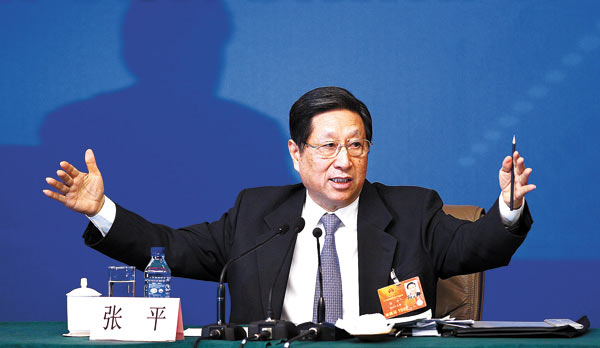
Zhang
Ping, minister of the National Development and Reform Commission,
discusses growth targets during the annual session of the National
People’s Congress on Wednesday. [Zou Hong / China Daily]
|
Target may be better for long-term sustainable development: official
Maintaining annual GDP growth between 7 and 8 percent is the best option for China's development, a senior official said on Wednesday.
Against this backdrop, lowering the GDP growth rate from 9.3 percent in 2011 to 7.8 percent in 2012 should be seen as a success rather than a setback, said Zhang Ping, minister of the National Development and Reform Commission, the leading economic policy body.
China will target this growth rate not only in 2013 but probably in the foreseeable future, he said.
In the Government Work Report to the National People's Congress on Tuesday, Premier Wen Jiabao proposed setting the GDP growth target at 7.5 percent in 2013, and the inflation target, as measured by the consumer price index, at 3.5 percent.
An engineered slowdown in GDP growth has a number of benefits as the economy enters a transition from being export driven to one with more focus on consumption, Zhang said.
China has already seen the benefits of greater consumption as a hedge against declining exports due to the global slowdown, he said.
New industries are being established and old ones are being upgraded, as urbanization continues and agriculture is modernized, the NDRC head said.
In 2012, GDP growth registered its slowest pace since 2001 but the country was still among the global growth leaders.
Li Daokui, an economics professor at Tsinghua University, said that the potential of domestic demand has yet to be fully tapped. China has no need to worry about its future growth, the former central bank adviser said.
However, Li said, "we should prepare for the difficulties that may turn up in the next three to five years, and try anything to sustain moderate growth".
Zhang also vowed to continue market-oriented reform, especially regarding the twin pillars of consumption and investment.
Domestic consumption in 2012 contributed 51.8 percent to GDP growth, according to the National Bureau of Statistics.
More measures were promised in the Government Work Report to boost urban and rural consumption.
Zhang said that the greatest driving force for domestic consumption will come from urbanization, and announced the NDRC will release a program in the coming months to coordinate it.
The movement of more people from rural areas to big cities will lead to a boost in infrastructure investment, an efficient way to ensure growth, said Wang Tao, chief China economist with UBS.
"Strong credit demand since the third quarter of 2012 should help push growth up further in the first and second quarters of 2013," Wang said.
"We think the government wants policies to support the ongoing recovery but avoid a property bubble or overheating," she said.
The credit expansion will help the government increase social security spending, embark on energy and utility price reforms, and implement pilot programs to replace the former business tax with value-added tax, Wang said.
Zhang said the NDRC is studying adjusting the pricing system for oil to better reflect the global price.
He also pledged to solve excess production capacity by encouraging mergers and acquisitions and helping businesses expand overseas.
Contact the writer at chenjia1@chinadaily.com.cn
 8:55 PM
8:55 PM
 specialshowtoday
specialshowtoday

 Posted in:
Posted in: 

0 comments:
Post a Comment